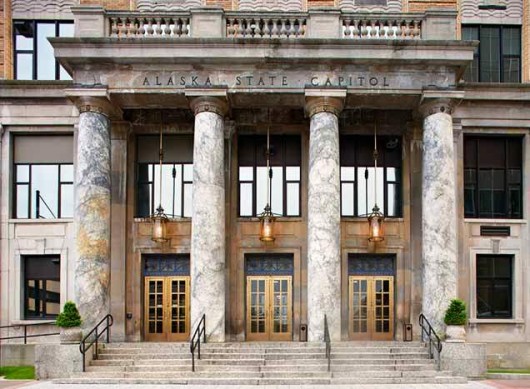The Ketchikan Gateway Borough responded this week to the state’s motion for a stay pending the state’s appeal with the Alaska Supreme Court of a lower court ruling in the borough’s lawsuit challenging the required local contribution for public education.
The state filed an emergency motion for a stay with the Supreme Court last week after filing a similar motion with the Superior Court, but then learning that the lower court wouldn’t be able to reach a decision quickly.
The state wanted a decision on the stay no later than Feb. 17 because the Legislature is meeting now, and the state argues that lawmakers need to know whether municipalities will continue to pay part of the bill for public schools. If the stay is denied, the Legislature will have to figure out how to respond to an approximately $300 million budget gap for education funding.
That will be particularly difficult this year, with state oil tax revenue in freefall and all state agencies tightening their belts in response.
The Ketchikan Gateway Borough filed its lawsuit against the state about a year ago. In his final decision last month, Superior Court Judge William Carey agreed with the borough’s argument that the required local contribution is essentially a state tax earmarked for a special purpose, and therefore violates the Alaska Constitution.
The state filed an appeal with the Supreme Court just a few days after Carey’s ruling.
In its response to the emergency motion for a stay, the borough argues that to be granted a stay, the state needs to show that it would be harmed if the motion is not granted and that the borough would not be harmed by a delay. The borough also argues that the state needs to show it has a likelihood of succeeding in its appeal.
The borough claims that the state’s motion fails on all three counts.
The response claims that in the original lawsuit before Judge Carey, the state had argued that it receives no benefit from the required local contribution. Therefore, “The state is not irreparably harmed by the absence of a payment from which it receives no benefit.”
The borough also argues that the Legislature is not legally required to fund public education at 100 percent, and that the state’s motion for a stay based its arguments on rank speculation of what lawmakers might do.
On the other hand, the borough argues that it would be harmed by a stay because the court has ruled that once the required local contribution is paid, the borough is not entitled to a refund, even if the Supreme Court eventually rules in the borough’s favor.
This year’s required local contribution in Ketchikan would be about $4.5 million.
The borough also questions the “emergency” nature of the motion for a stay. The governor already has submitted his amended budget to the Legislature, and the borough argues that lawmakers regularly wait until closer to the end of the legislative session to make final budget decisions.
This legislative session ends April 19.
Regarding the potential for the state to win its appeal, the borough argues that earlier Supreme Court cases involving the constitutionality of a dedicated tax establish a clear precedent in the borough’s favor.
The state’s motion for a stay obviously provides a different point of view. The motion argues that Judge Carey erred when he determined that the required local contribution counts as a state tax.
The state’s motion also argues that even if the court was correct in defining the required local contribution as a state tax, the Constitution provides an exemption from the dedicated funds clause for cooperatively financed programs involving the state and municipal governments.
This story has been edited to clarify the different courts in which the state has filed for a stay.






